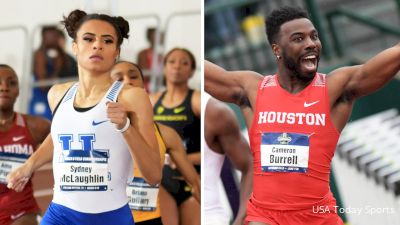Five Races That Will Be Especially Close At NCAA Prelims
Five Races That Will Be Especially Close At NCAA Prelims
Here are a few of the deepest events that could lead to some intense battles for the 12 qualifying spots at the NCAA Prelims.

The race for the top 12 begins this Thursday in Sacramento, California, and Tampa, Florida, as the NCAA's best try to navigate the preliminary rounds and advance to Eugene. The qualifying system is clear-cut and unforgiving, making events with obvious favorites still very intriguing. Here are five of the deepest events that could lead to some intense battles for the 12 qualifying spots.
Watch The NCAA DI East and West Preliminary Rounds Live On FloTrack
Men's 5000m: West
The sheer depth of the men’s 5000m makes it hard to feel confident narrowing the list down to 12 names. Seed times don’t give as good an indication of the pecking order in the distance races with many athletes running just to qualify throughout the season. This field is filled with athletes who have championship experience and, in some cases, NCAA titles.
Stanford’s Grant Fisher is the reigning NCAA champion in this event and Andy Trouard of NAU won the 3000m at the NCAA Indoor Championships in March. Jack Bruce of Arkansas was runner-up to Fisher last year and has run 13:28 this year. BYU has four entrants in the field with Clayton Young, Rory Linkletter, Connor McMillan, and Daniel Carney.
All-Americans Dillon Maggard (Utah State), Cole Rockhold (Colorado State), Colby Gilbert (Washington), and Mike Tate (Southern Utah) should be safely through, but in a field this tough it will take a solid effort. Colorado has two top entrants in Zach Perrin and Ryan Forsyth. Oregon’s Cooper Teare and Northern Arizona’s Luis Grijalva, both freshmen, have proven themselves more than capable of turning in a big performance.
In short, somebody deserving isn’t going to make the cut.
Women’s 5000m: West
Like the men’s race, the women’s 5000m in Sacramento is completely loaded, and odds are someone with championship experience will find themselves on the wrong side of the cutoff. Five of the top six women from the 5000m at the NCAA Indoor Championships (and 10 of the top 13 in the 3000m) are in this race.
Karissa Schweizer of Missouri and Allie Ostrander will be racing their second events of the weekend, but they shouldn’t have any issue finding their way into the top 12. The same is true for NCAA cross country champion Ednah Kurgat, Kurgat’s New Mexico teammate Weini Kelati, and Vanessa Fraser of Stanford.
However, there’s isn’t much margin for error.
The race also features Amy-Eloise Neale of Washington, Fiona O’Keefe (Stanford), Marie Bouchard (San Francisco), Sharon Lokedi (Kansas), Lilli Burdon (Oregon), and Makena Morley (Colorado).
Claire Green of Arizona, Kaitlyn Benner of Colorado, Clare O’Brien and Emily Venters of Boise State, Charlotte Taylor of San Francisco, and Erin Clark of Colorado sit 12th through 17th on the seeding—all of whom are capable of grabbing a qualification spot.
Women's 800m: East
It took 2:07.96 to qualify for the meet, the fastest time required in the nine-year history of the preliminary qualification system.
That high bar is also accompanied by a parity. The top seed, Heather MacLean of UMass, is 10th on the yearly performance list across the NCAA. Most of the best women’s 800m times have come from out west this season.
Add in the fact that 2:03 runner Kayla Johnson of Miami is not competing in the meet and Rachel Pocratsky, Danae Rivers, and Jaime Morrissey are all focusing on the 1500m, and suddenly you have a field with a high floor and a low ceiling.
MacLean’s 2:03.45 is the best of the remaining entrants, but Villanova’s Siofra Cleirigh Buttner might be the one to beat by virtue of her runner-up finish at the NCAA Indoor Championships.
But this meet is about finishing in the top 12. There it is also jumbled. Five women have seed times in the 2:03s, three in the 2:04s, and 11 in the 2:05s.
Men’s 110m Hurdles: East
Grant Holloway of Florida is in a class by himself and should have no issue advancing to Eugene. Three of Holloway’s SEC compatriots—Daniel Roberts (Kentucky), Ruebin Walters (Alabama), and Damion Thomas (LSU)—have all run under 13.40 this season and are also are in good position. That has put a bit of separation between those four and rest of the field.
The race for the other eight spots is where it gets complicated. Nine hurdlers are clumped between 13.54 and 13.69, including Florida State’s Trey Cunningham and Chad Zallow of Youngstown State. Zallow has finished in the top eight in the last two NCAA Indoor Championships and sits 13th on the seeding. Outside of that group, there are other top hurdlers. ACC champion Angelo Goss of Syracuse has a season best of 13.72 and is ranked 15th entering this meet.
Women's 100m Hurdles: East
Much like the men’s race, there are heavy favorites and then a mad scramble for the remaining qualifying spots. Jasmine Camacho-Quinn of Kentucky and Devynne Charlton of Purdue are the top two seeds at 12.40 and 12.70.
The real fun will be sorting out the back end of this race. Georgia super freshman Tara Davis is seeded 12th with a mark of 13.04, but after that it gets very hard to sort things out. Seeds 13 through 19 are separated by just 0.03 seconds. Yes, the top 12 qualify, but how often to hurdle races in championship settings go to plan?